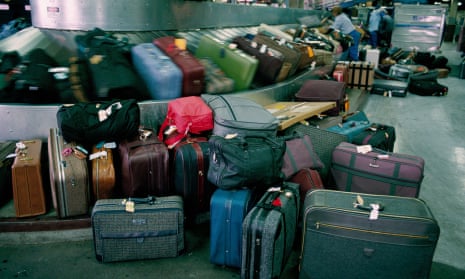Do you get anxious waiting at the baggage carousel in the airport? I do. And the longer it takes for my luggage to appear, the edgier I get. It is= a fear of that moment when only a handful of battered suitcases are trundling around, none of which are yours.
But imagine, as you rush to the inquiry desk to vent your spleen you get a text on your phone saying: “I’m on carousel 5, come and pick me up.”
Your suitcase is the latest product to be given a technology makeover, with in-built GPS tracking and messaging. That means bags will be able to pair with your phone and send you a text about where they are, when they have been taken off a plane or if someone opens them without your consent.
But is “smart luggage” fulfilling a user demand?
Ramesh Tainwala, CEO of the luggage company Samsonite, insists it is not a fad. He predicts embedded technology will be as big a leap for the luggage world as suitcase wheels in the 1970s.
“Smart luggage will communicate on one side with the owner and on the other with the carriers handling it. Everything will be connected. This will be the next big thing,” he says.
Think ahead to luggage that can check itself in at airports or a motorised suitcase that can follow you around, a bit like a robotic dog.
Following the lead of fashion brands that are teaming up with tech companies to weave fitness sensors into clothing, so Samsonite is partnering with Samsung to launch a new range of connected luggage by the end of the year.
Not all of this innovation is coming from big-name brands, there are growing numbers of start-ups pushing the boundaries too. US-based Planet Traveler has turned to the crowdfunding website Kickstarter to help to launch its Space Case 1. Its hi-tech gadgets include biometric fingerprint locking, global tracking, self-weighing digital scales, even Bluetooth speakers that can turn your suitcase into a boom box or a phone.
“Smart luggage is tapping into that paranoia we have about things not going quite right,” says Richard Cope, a trends analyst at the research group, Mintel. “It’s ‘smart home’ tech going out into the open world.”
Numbing that paranoia is an expensive business, though. The Space Case 1 is expected to cost about £450 for the full-size bag, and £390 for the carry-on.
But will GPS-tracking luggage cause havoc for airport security? How does this square with those constant reminders to switch off phones anywhere near an aircraft?
Tainwala admits there are issues, but believes they are close to resolving them. He is so confident, in fact, that he believes technology will be integral to all of Samsonite’s luggage in the next five to 10 years. “Whether you activate it or not, the luggage will just come with it,” he says. Others are not so convinced.
May Ling, a research manager at market intelligence firm Euromonitor, says: “Smart luggage will be scrutinised by government securities around the world. One could imagine them taking the ‘better safe than sorry’ approach and banning it completely to avoid complications.”
The Department for Transport declined to comment. Crucially, perhaps, the big airlines are understood to be keen for smart luggage to break into the mainstream and are working with companies such as Samsonite to iron out the security challenges.
Cope says: “Smart luggage makes sense for the industry – they want things to be as efficient as possible.”
But what about the consumer? Eleanor Aldridge, a senior editor at Rough Guides, the travel guides publisher, questions whether we are ready for this type of technology, especially because “digital detoxing” – holidaying without smartphones or connections to the internet – is very popular.
“Travellers want to find a balance between tech that enriches their trip and gadgets that tie them into constant connectivity”, she says.
Aldridge predicts many of the gadgets in smart luggage will date quickly, but believes features such as GPS tracking could be more enduring.
“Whether you’re waiting for a suitcase at the airport or you’ve thrown a bag on to the roof of a bus for a 10-hour journey, knowing where it is offers huge peace of mind,” she says.
There might be something else for smart-luggage brands to worry about, though. Cope predicts that in the future we won’t bother to pack at all. Instead, when we get to our destination, the clothes and things we need for our trip will already be there waiting for us, hired in advance for the duration of our stay. “That’s where we’re headed,” he says.
Not so much smart luggage then, as no luggage at all.

Comments (…)
Sign in or create your Guardian account to join the discussion